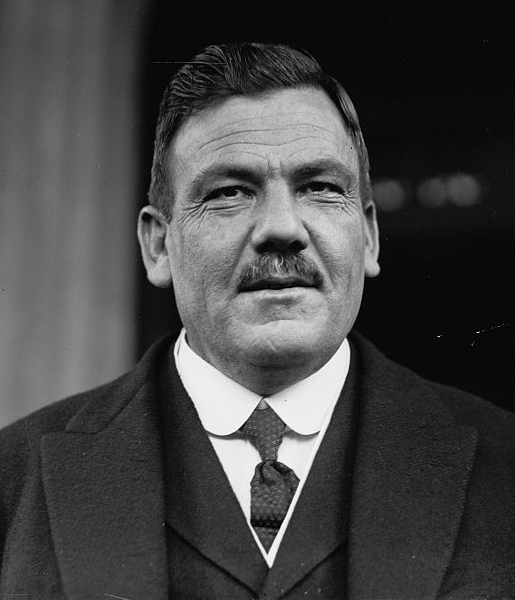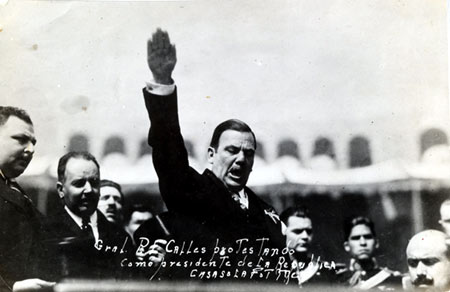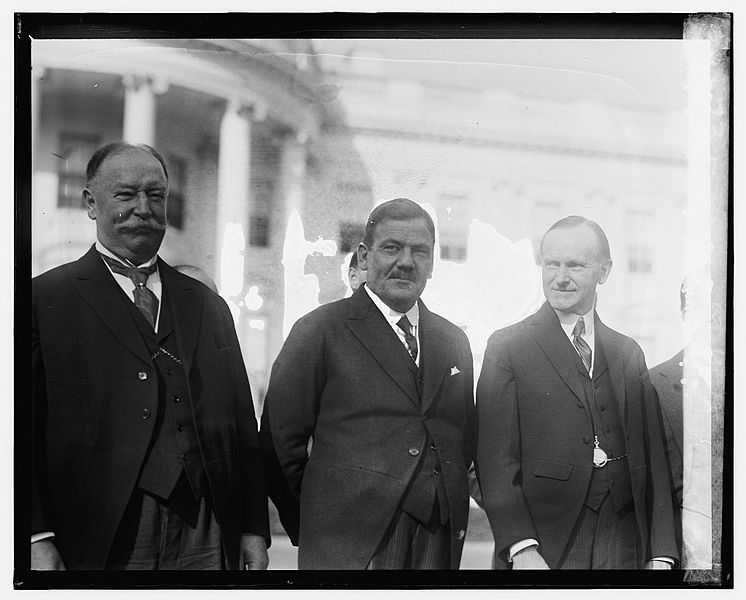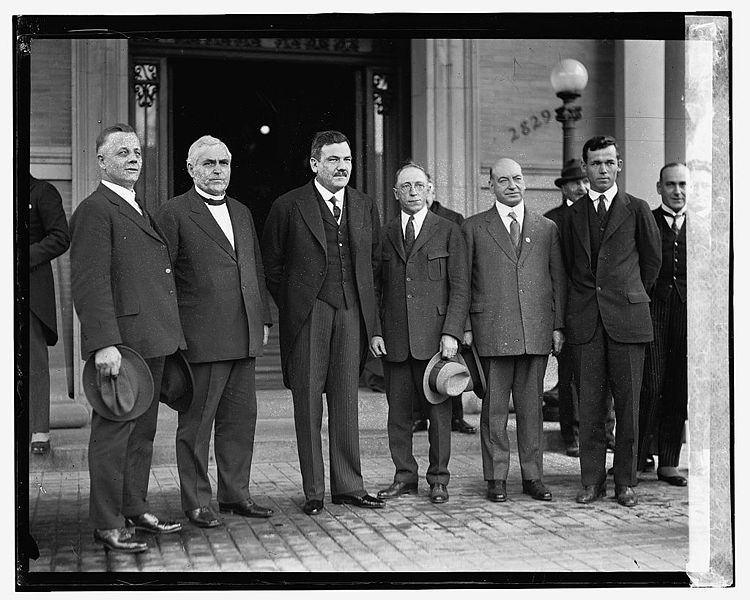<Back to Index>
- Entomologist Agostino Bassi de Lodi, 1773
- Architect William Le Baron Jenney, 1832
- 40th President of Mexico Plutarco Elías Calles, 1877
PAGE SPONSOR


Plutarco Elías Calles (September 25, 1877 – October 19, 1945) was a Mexican general and politician. He was president of Mexico from 1924 to 1928, but he continued to be the de facto ruler from 1928 – 1935, a period known as the maximato. Calles is most noted for his fierce oppression of Roman Catholics which led to the Cristero War, a civil war between Catholic rebels and government forces that erupted as a reaction against his anticlerical policies, and for founding the Partido Nacional Revolucionario (National Revolutionary Party, or PNR), which eventually became the Institutional Revolutionary Party (PRI) – which governed Mexico for more than 70 years.
His father being an alcoholic and unmarried to his mother, Elías Calles grew up in poverty and deprivation. He adopted the Calles surname from the uncle who raised him after the death of his mother, Maria de Jesús Campuzano. Elías was his father's surname, who, despite his degenerate nature, descended from a prominent family in the Provincias Internas, most often written out as Elías González. The first of this line to settle in Mexico was Francisco Elías González de Zayas (1704 – 1790), a Spaniard of distant Sephardic Jewish ancestry. Elías González emigrated from La Rioja, Spain, to Alamos, Sonora, Mexico, arriving in 1729, where, as commander of the presidio of Terrenate, he played a role in the wars against the Yaqui and Apache.
Plutarco worked many different jobs from a bartender to a schoolteacher. Calles had a keen sense of political opportunity. He was a supporter of Francisco I. Madero, under whom he became a police commissioner, and his ability to align himself with the political winners of the Mexican Revolution (1910 – 1920) allowed him to quickly move up the ranks, attaining the rank of general in 1915. He led the Constitutional Army in his home state Sonora, and managed to repel the conventionalists of José María Maytorena and Pancho Villa in the Battle of Agua Prieta in 1915.
In 1915, Elías Calles became governor of Sonora and
became known as one of the most reformist politicians of his
generation. His radical phraseology tended to conceal the pragmatic
essence of his policy, which was to promote the rapid growth of Mexican
national capitalism, whose infrastructure he helped to establish. In
particular, he attempted to make Sonora a dry state, he
promoted legislation giving social security and collective bargaining
to workers, and he expelled all Catholic priests from Sonora. In 1919, Venustiano Carranza promoted Calles to Secretary of Commerce, Industry and Labor. In 1920 Calles aligned himself with Álvaro Obregón to overthrow Carranza, and Obregón named him head of the interior ministry. Calles used his ability to draw in labor class votes to come to power with Obregón. He aligned himself with the Laborist Party and was in 1924 elected president, defeating the agrarianist candidate Ángel Flores and the eccentric perennial candidate Nicolás Zúñiga y Miranda. Calles'
presidency was supported by labor and peasant unions. The Laborist
party which supported his government in reality functioned as the
political - electoral branch of the powerful Regional Confederation of Mexican Workers (CROM), led by Luis Napoleón Morones. Shortly before his inauguration he had travelled to Europe to study social democracy and
the labor movement, and he tried to implement the things he had learned
there in Mexico. Calles supported land reforms and promoted the ejido as
a way to emancipate campesinos but nonetheless no large tracts of land
were redistributed under his presdidency. Calles founded several banks
in support of campesinos as well as the Banco de México, Mexico's national bank. Calles secretary of hacienda Alberto J. Pani managed to achieve debt relief of a part of Mexico's foreign debt. After a conflict with Calles, Pani resigned in 1927. Calles changed Mexico's civil code,
giving illegitimate children the same rights as legitimate, partly as a
reaction against the problems he himself often had encountered being a
child of unmarried parents. According to false rumours, his parents had been Syrians or Turks, giving him the nickname El Turco (The Turk). His detractors drew comparisons between Calles and the 'Grand Turk', the barbarian anti-Christian leader from the era of the Crusades. In order not to draw too much attention to his bad childhood, Calles chose to ignore those rumours rather than to fight them. One
of the major points of contention with the U.S. was oil. Calles quickly
rejected the Bucareli Agreements of 1923 between the U.S. and Mexico,
when Álvaro Obregón was
president, and began drafting a new oil law that would strictly enforce
article 27 of the Mexican constitution. The oil problem stemmed from
article 27 of the Mexican Constitution of 1917, which restated a law
from Spanish origin which makes everything under the soil property of
the state. The language of article 27 threatened the oil possession of
U.S. and European oil companies, especially if the article was applied
retroactively. A Mexican Supreme Court decision had ruled that
foreign - owned fields could not be seized as long as they were already
in operation before the constitution went into effect. The Bucareli
Agreements stated that Mexico would agree to respect the Mexican
Supreme Court decision in exchange for official recognition from
Washington of the presidency of Álvaro Obregón. The
reaction of the U.S. government to Calles' intention to enforce article
27 was swift. The American ambassador to Mexico, Ambassador Sheffield
branded Calles a communist, and Secretary of State Kellogg issued a threat against Mexico on June 12, 1925. Calles himself never considered himself a communist but considered revolution a way of governing rather than an ideological position. Public
opinion in the United States turned particularly anti-Mexican when the
first embassy of the Soviet Union in any country was opened in Mexico,
on which occasion the Soviet ambassador remarked that "no other two
countries show more similarities than the Soviet Union and Mexico". After this, some in the United States government, considering Calles' regime Bolshevik, started to refer to Mexico as "Soviet Mexico". The
debate on the new oil law occurred in 1925, with U.S. interests
opposing all initiatives. By 1926, the new law was enacted. In January
1927 the Mexican government canceled the permits of oil companies that
wouldn't comply with the law. Talks of war circulated by the U.S.
president and in the editorial pages of the New York Times.
Mexico managed to avoid war through a series of diplomatic maneuvers.
Soon after, a direct telephone link was established between Calles and
President Calvin Coolidge, and the U.S. ambassador to Mexico, Sheffield, was replaced with Dwight Morrow.
Morrow successfully won the Calles government over to the United
States' position, and helped negotiate an agreement between the
government and the oil companies. Another source of conflict with the United States was Mexico's support for the liberals in the civil war in Nicaragua,
as the United States supported the conservatives. This conflict ended
when both countries signed a treaty in which they allowed each other to
support the side they considered to be the most democratic. On June 14, 1926, President Calles enacted an anticlerical legislation known formally as The Law Reforming the Penal Code and unofficially as the Calles Law. His anti-Catholic actions
included outlawing religious orders, depriving the Church of property
rights and depriving the clergy of civil liberties, including their
right to trial by jury (in cases involving anti-clerical laws) and the
right to vote. Catholic antipathy towards Calles was enhanced because of his vocal atheism. He was also a Freemason. Regarding this period, recent President Vicente Fox stated,
"After 1917, Mexico was led by anti-Catholic Freemasons who tried to
evoke the anticlerical spirit of popular indigenous President Benito Juárez of the 1800s. But the military dictators of the 1920s were a lot more savage than Juárez." Due to the strict enforcement of anti-clerical laws, people in strongly Catholic areas, especially the states of Jalisco, Zacatecas, Guanajuato, Colima and Michoacán, began to oppose him, and this opposition led to the Cristero War from
1926 to 1929, which was characterized by brutal atrocities by both
sides. Some Cristeros applied terrorist tactics, while the Mexican
government persecuted the clergy, killing suspected Cristeros and
supporters and often retaliating against innocent individuals. On
May 28, 1926, Calles was awarded a medal of merit from the head of
Mexico's Scottish rite of Freemasonry for his actions against the
Catholics. About 90,000 people on both sides died in the war. A truce was negotiated with the assistance of U.S. Ambassador Dwight Whitney Morrow, in
which the Cristereos agreed to lay down their arms. Calles, however,
did not abide by the terms of the truce, he had approximately 500
Cristero leaders and 5,000 other Cristeros shot, frequently in their
homes in front of their spouses and children. Particularly
offensive to Catholics after the supposed truce was Calles' insistence
on a complete state monopoly on education, suppressing all Catholic
education and introducing "socialist" education in its place: "We must
enter and take possession of the mind of childhood, the mind of youth." The persecution continued as Calles maintained control under his Maximato and did not relent until 1940, when President Manuel Ávila Camacho, a believing Catholic, took office. The effects of the war on the Church were profound. Between 1926 and 1934 at least 4000 priests were killed or expelled. Where
there were 4,500 priests serving the people before the rebellion, in
1934 there were only 334 priests licensed by the government to serve
fifteen million people, the rest having been eliminated by emigration,
expulsion, and assassination. By 1935, 17 states had no priest at all. Under
Calles a constitutional change was passed that allowed for a
non-consecutive reelection, and in 1928 Obregón was elected as Calles' successor. However, Obregón was murdered by José de León Toral, a Catholic militant, before he could assume power. To avoid a political vacuum, Calles named himself Jefe Máximo, the political chieftain of Mexico and Emilio Portes Gil was
appointed temporary president, although in reality he was little more
than a puppet of Calles. The following year, Calles founded the PNR, or
Partido Nacional Revolucionario, the predecessor of today's Partido
Revolucionario Institucional (PRI). The period between 1928 and 1934, in which Calles was Jefe Máximo, is known as the Maximato in Mexican history, with many regarding Emilio Portes Gil, Pascual Ortiz Rubio, and Abelardo Rodríguez as
his puppets. Officially, after 1929, he served as minister of war, as
he continued to suppress the rebellion of the Cristero War, but a few
months later after intervention of the United States ambassador Dwight Morrow the
Mexican government and the cristeros signed a peace treaty. During the
Maximato, Calles became increasingly authoritarian. In the early 1930s
he appears to have flirted with the idea of implementing aspects of fascism in the government, and the ideology clearly had an influence on him. After a large demonstration in 1930, the Mexican Communist Party was banned, Mexico stopped its support for the rebels of César Sandino in Nicaragua,
strikes were no longer tolerated, and the government ceased
redistributing lands amongst poorer peasants. Calles had once been the
candidate of the workers and at one point had used Communist unions in
his campaign against competing labor organizers but later, having
acquired wealth and engaging in finance, suppressed Communism. In 1934, Calles selected his old wartime subordinate Lázaro Cárdenas as
presidential candidate, on the false assumption he could control
Cárdenas as he had controlled his predecessors. Soon after his
inauguration however, conflicts between Calles and Cárdenas
started to arise. Calles opposed Cárdenas' support for labor
unions, especially his tolerance and support for strikes, while
Cárdenas opposed Calles' violent methods and his closeness to
fascist organizations, most notably the Gold Shirts of general Nicolás Rodríguez Carrasco, which harassed Communists, Jews and Chinese. Cárdenas
started to isolate Calles politically, removing the callistas from
political posts and exiling his most powerful allies: Tomás Garrido Canabal, Fausto Topete, Emilio Portes Gil, Saturnino Cedillo, Aarón Sáenz and finally Calles himself. Calles and Luis Napoleón Morones,
one of the last remaining influential callistas, were charged with
conspiring to blow up a railroad and placed under arrest under the
order of President Cárdenas and deported on April 9, 1936 to the
United States. At the time of his arrest, he was reportedly reading a
Spanish translation of Mein Kampf. In exile in the United States, Calles was in contact with various American fascists, although he rejected their anti-Semitic and anti-Mexican sentiments, and also befriended José Vasconcelos,
a Mexican philosopher who had previously been a political enemy. Calles
was allowed to return to Mexico under the reconciliation policy of
Cárdenas' successor Manuel Ávila Camacho in 1941. He spent his last years quietly in Mexico City and Cuernavaca. Back in Mexico, Calles' political position become more moderate; in 1942 he supported Mexico's declaration of war upon the Axis powers. In his last years he reportedly became interested in Spiritualism. A
few months before his death in October 1945, aged 68, Calles reportedly
stated that he "most certainly believed" in a higher power. Calles' main legacy was the pacification of Mexico ending the violent era of the Mexican Revolution through
the creation of the Partido National Revolucionario (PNR) which
eventually became Partido Revolucionario Institutional (PRI), which
governed Mexico until 2000. Calles' legacy remains controversial today. He is honored with statues in Sonoyta, Hermosillo, and his hometown of Guaymas. The official name of the municipality of Sonoyta is called General Plutarco Elías Calles in his honor. His starting the PRN is also criticized as the beginning of a long undemocratic period in Mexico. He was denounced by Pope Pius XI in the encyclical Iniquis Afflictisque (On
the Persecution of the Church in Mexico) as being "unjust", for a
"hateful" attitude and for the "ferocity" of the war which he waged
against the Church.
Calles will be portrayed by the actor Ruben Blades in the upcoming film Cristiada, an epic historical drama also starring Andy Garcia, Peter O'Toole, Eva Longoria Parker, Alma Martinez, and Eduardo Verástegui.

